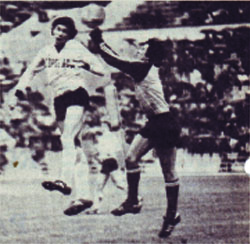The Austrian Cup opposed the usual suspects, which provided yet another derby. And it was also a clear picture of the state of Austrian football – two clubs were so far above all others, that would be almost a crime there was even one different Cup finalist. FK Austria vs Rapid – the face of Austrian football, the big rivalry. Motivation in itself. Nobody gives up, no mater form or anything else. The arch-rivals clashed heavily and entertained the crowd – the match ended 3-3 and went to the drama of penalty shoot-out. There Rapid prevailed 6-5.

This was 3rd consecutive Cup victory for Rapid,which perhaps irritated Austria greatly. As far as Rapid was concerned, the season was saved – they got a trophy. As far as photos… the problem is the same as with Aistria. According the the club’s website, this is the team of 1984-85. However, the kit does not match the ones used this year – it seems to be the kit for 1983-84. Then again… the squad, as Austria’s, was practically unchanged. Aged Panenka was no longer a regular, but was he in the team at all? Hard to tell. Well, this Austrian season left few pictorial memories, so let take it at that – tentatively.
Austria I Division
First Division. Not much of a dramatic championship, really. 13 teams were largely concerned with avoiding the last 5 places in the league and the last three were unequal as well, so there was one-team dominance this year. The title was decided early and that was that. As for the battle on the bottom, it was also not much of a fight – some teams were clearly weaker than the rest and the others were seemingly satisfied only to accumulate enough points and secure their place in the new league.
The relegated were: First Vienna FC, last with 17 points.
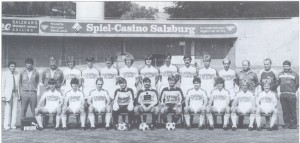
Austria (Salzburg) – 15th with 18 points.
Favoritner AC – 14th with 21 points,
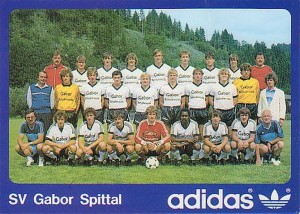
SV Spittal/Drau – 13th with 24 points (the eternal problem with Austrian names – sponsor names are incorporated, so… it could be SV Spittal/Drau, but it could be SV Gabor Spittal at the same time), and Wiener Sport-Club – 12th with 25 points. Tough luck.
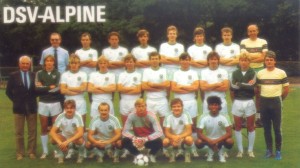
Good luck for DSV Alpine (Donawitz) – or Donawitzer SV Alpine – take it as you like, but they clinched safe 11th place with 27 points. Top row from left: Rauch, Janjanin, Ivsic, Haberl, Koiner, Hofer, Lederhaas, Klug.
Middle row: Dr. Wilthold, Auffinger, Ettl, Harrer, Haberl J., Crnjak, Haider, Sobl, Jursitzky, Windisch.
Crouching: Stocker, Schicker, Angerer, Gruber, Oliveira. Perhaps the Yugoslav Janjanin was the only recognizable name, however faintly.
Grazer AK was 10th with 28 points,
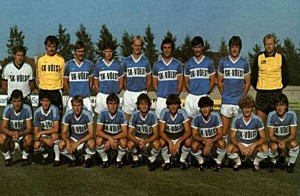
VOEST (Linz) – 9th with 28 points, SC Eisenstadt – 8th with 28 points, Austria (Klagenfurt) – 7th with 31 points,
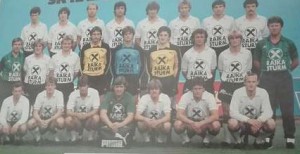
SK Sturm (Graz) – this is only a possible photo of the team – 6th with 32 points, FC Admira/Wacker (Wien) – 5th with 32 points, Wacker (Innsbruck) – 4th with 32 points. That was the bulk, which managed to secure participation in the reformed First Division.
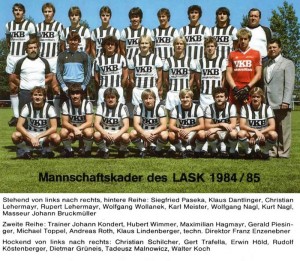
LASK (Linz) – Linzer ASK – was another matter. They finished comfortably 3rd with 38 points. One of their strongest seasons, but it was strong season only in their own terms: they had no squad to challenge the usual leaders and third place was the most they can do. Better than the rest of the league, that was their measurement, not Rapid and Austria. Nothing to do with the title.
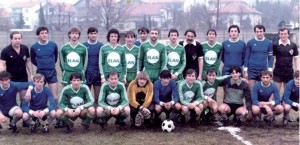
Rapid (pictured here in a friendly with Yugoslav Mladost (Litica) had nothing to do with the title, but for different reasons than those of LASK: seemingly, they gave up on the championship and concentrated on international football this season. Otherwise it is difficult to explain why they finished 9 points behind arch-rivals Austria – their squad was as good as Austria and European performance denies the idea they were out of form. But with 45 points, they were very distant 2nd. Still vastly superior to LASK, though – 7 points ahead, no rivalry at all.
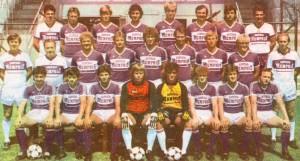
Sitting from left: Alfred Drabits, Hans Dihanich, Franz Zore, Friedl Koncilia, Franz Wohlfahrt, Andreas Ogris, Dzemal Mustedanagic, Istvan Magyar (moved to SC Eisenstadt shortly after this picture was taken).
Middle row: Thomas Paritz – coach, Schreitl – masseur, Herbert Prohaska, Erich Obermayer,Toni Polster, Tibor Nyilasi, Karl Daxbacher, Ernst Baumeister, Holdhaus (?) – condition coach.
Top row: Janotka (?) – assistant coach, R. Sara, Josef Degeorgi, Fritz Drazan, Josef Heiling, Ewald Turmer, Gerhard Steinkogler, Pelzmann – masseur.
There was no contest at all – Austria (Wien) won 25 games, tied 4 and lost just 1. 85-17 goal-difference and 54 points. They were champions long before the end of the season, very likely all was finished at the end of the fall half of the season and this casual superiority left no particular memories: even the club’s website does not signify this victory with team photo. Thus, the squad is a bit of enigma: it is practically the same of the year before. The biggest change was the new coach – the former Austrian international Thomas Paritz.
Austria II Division
Austria. From the distance of time, this season gives the impression it was somewhat neglected and the real focus was on the previous and the next season, plus the interest in the international success of Rapid. The big domestic thing was the reform of the the two top leagues – the next season the whole format of the championship was going to be different, including large reduction of the teams – from the current 16 in first and second divisions to 12 in each. That meant 8 teams less and naturally relegation was on the mind of most clubs – 5 teams were to be relegated from the First Division and 11 from the Second. As promotions, only the winner of Second Division was going up after the end of the season and 2 teams – as usual – were to be promoted from third level to the new Second Division. May be that was the central issue and concern this year – there was no competing for the title, for instance, and in both current leagues just 6 teams were securely above the rest and too strong to be in danger of going down.
Because of the circumstances should be enough only to state those winning promotion from third level and those surviving to play another season in the second level. Schwechater SC won the Ost league of Third Division and Bregenz/Dornbirn won the West league. Bregenz/Dornbirn was a curious and problematic team – it was the second team not of one, but of two clubs: Schwartz-Weiss (Bregenz) and FC Dornbirn. Seemingly, the clubs merged and left over players made the second team. The first played in the Second Division, finished 8th and was relegated, thanks to the reduction. So, the first team was going down and the second was going up – a bit of a problem.
Only 4 teams were going to remain in the Second Division after this season – those between 2nd and 6th place in the final table. Flavia Solva Wagna aimed higher, but lost to win the championship by a point – 2nd, Kremser FC – also unlucky to win promotion and 3rd, SV Sankt Veit – concerned with avoiding relegation only and 4th at the end and the similarly lucky guys of Vorwaerts Steyr, 5th. Vorwaerts was really lucky, for one match was not played because of players strike. Again, the outcome was curious: the players of Simmeringer SC were on strike, but their opponents SV Thorl did not get points either. Only theoretically SV Thorl had a chance to finish ahead of Vorwaerts, but there was a chance: if the match against Simmeringer SC was played and SV Thorl won by 5 goals. Anyhow, the above mentioned remained in the new Second Division.
The first two of them were entangled in hot pursuit of first place and eventually lost it to Salzburger AK.
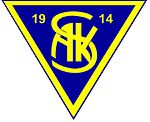
SAK – full name Salzburger Athletiksport-Klub 1914 – was founded in the distant 1914 in Salzburg, but had very little to be proud of: so far, they appeared only twice in the top league – in 1953 and 1962 – and both times they went right back to second level. This was their third attempt, which also proved to be not only short-lived as before, bur their last time to go play first division football. It was great at the moment, though – dramatic victory with 43 points, one more than Flavia and 2 more than Kremser. 17 wins, 9 ties, 4 losses, 57-18 goal-difference. Something to celebrate, although how many people celebrated is difficult to measure: Salzburg supported its Austria, in general, and the left-overs were divided between SAK, USV (also playing in the Second Division this season, but they were 11th and relegated), and may be some more small clubs. Thus, it was wonderful to go up, but money was a big problem.
Czechoslovakia the Cup
The Czechoslovak Cup. As it had been established long ago, it was a clash between the winners of the Czech Cup and the Slovak Cup. Dukla (Prague) vs Lokomotiva (Kosice). Given the difference between the squads and the general decline of Slovak football, the final should not have been predestined. But such games hardly ever follow the obvious expectations – Dukla eventually won, but it was not a walk in the park. Lokomotiva fought back and lost minimally – 2-3.

Clearly the underdog in the final and for that reason would have been nice to see them prevail, but reality cannot be avoided: Lokomotiva had quite a weak squad presently and the best they could do was to play a brave final.
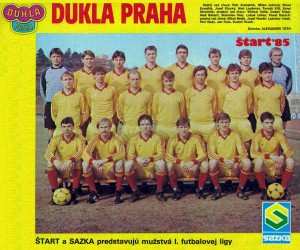
Dukla (Prague) won its 7th Cup, which was fine, but also it was a consolation prize: this team should have been a title contender, but was not. The season was quite disappointing and in view of the rise of Sparta, looked like that Dukla would be second-best in the future, at best. Thus, the Cup was still more than consolation prize. Then again, Dukla had few friends… most people preferred the symbol of Communist power losing. Politics aside, Dukla collected one more trophy.
Czechoslovakia I Division
First Division. Two teams competing for the title, two teams competing for 3rd place, much weaker, but fairly equal rest of the league, the general decline of the Slovak clubs remained, one unusual outsider. Perhaps not really an outsider – just a team which gave up at some point of the championship.

TJ Slovan CHZJD (Bratislava) – last with 19 points and relegated. The club was in decline for some years, but relegation seemed unthinkable. Yet, it happened and the most successful internationally club went down.
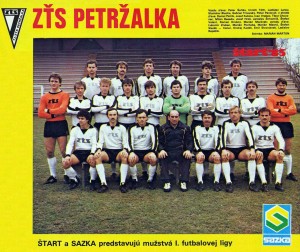
TJ ZTS (Petrzalka) – it was ironic to see the small club, practically from Bratislava, ahead of their famous neighbours, but that was what happened. 15th with 21 points. Relegated as well, but it was expected – their company was unexpected. Yet, both teams were similarly weak – Petrzalka had the former star of Slovan Marian Masny was their sole aged star. Slovan’s mosr recognizable player at the moment was also a veteran – the goalkeeper Pavol Michalik.

TJ ZVL (Zilina) – 14th with 23 points. Traditionally, Zilina always fought only for survival and managing to escape relegation meant good season for them. Well, they survived this time.
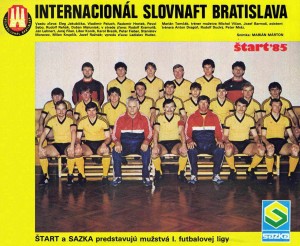
TJ Inter Slovnaft (Bratislava) – 13th with 23 points. Also in decline, but better than their famous neighbours. At least , Inter stayed in the league – Slovan was relegated.
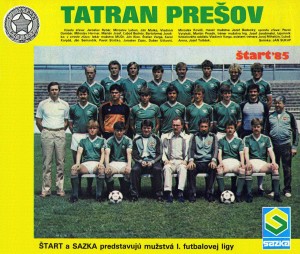
TJ Tatran (Presov) – like Zilina, Tatran meandered between 1st and 2nd division and just avoiding relegation was great for them. Thus, it was fine season – 12th with 24 points – but in general, it was not not: the last 5 teams in this championship were Slovak and the remaining 3 were not much better.
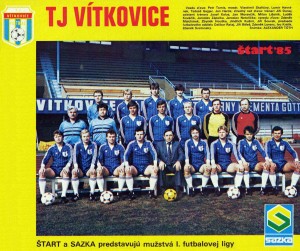
TJ Vitkovice (Vitkovice) – 11th with 26 points. The lowest-placed Czech club, but it was fine for the boys – Vitkovice had no big presence in the top league historically.
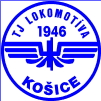
TJ Lokomotiva (Kosice) – 10th with 27 points. Another Slovak club with weak season, but Lokomotiva was able to put itself together when it mattered most on one hand and on the other – their city rivals were already in Second Division and not doing well even their. From such angles, Lokomotiva was satisfying.
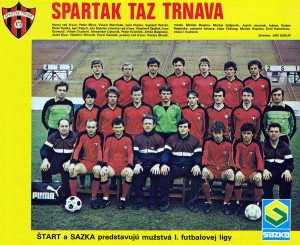
TJ Spartak TAZ (Trnava) – in decline for years and not showing signs for revival, but in terms of Slovak football only – doing better than most. 9th with 29 points.

TJ Ruda hvezda Cheb SVS MV (Cheb) – 8th with 30 points. Never a strong team, Ruda hvezda just enjoyed mid-table position, mostly thanks to the weaknesses of others.
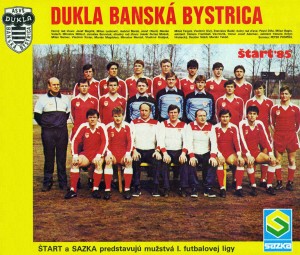
ASVS Dukla (Banska Bystrica) – the best performing Slovak club at the moment, but even that was not much: 7th with 31 points. May be the fact they were Army club helped.

TJ Sigma ZTS (Olomouc) – a club with short first division history, but seemingly on ascent and one of the few bright news in the league. 6th with 31 points.
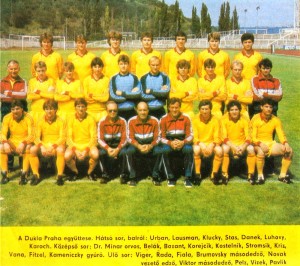
ASVS Dukla (Prague) – 5th with 32 points. Just a few years back it looked like Dukla was going to restore its domination in Czechoslovakian football, but there was no more believe there will be another golden period like those between 1950 and 1965. Good teams – yes; great ones – no. This seasons Dukla was far, far away not only from the title, but form the battle for bronze medals as well.
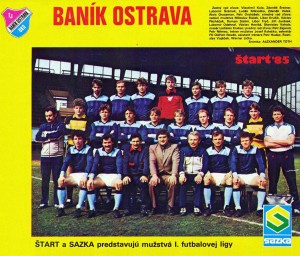
TJ Banik Ostrava OKD (Ostrava) – looked like they were slowly fading away. No new great talent after Werner Licka, who was not old at all, but the other well-known stars of the team were. Nothing terrible yet, but Banik only maintained a place among the top teams of the country – not a title contender and losing even 3rd place: 4th with 39 points. 7 points ahead of Dukla, but lost bronze medals on goal-difference to a team, which suffered for many years.
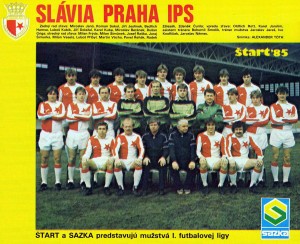
SK Slavia Praha IPS (Prague) – 3rd with 39 points and better goal-difference than Banik’s. Looked like Slavia was reemerging after long decline. Yet, such hopes were entertained before without fulfillment. This time Slavia had first-rate talent – Kubik, Knoflicek – and solid established players – Rott, Jarolim, Nemec. Were they to be champions was a question for the future – presently, they were not ready for more than competing for 3rd position.

TJ Bohemians CKD (Prague) – still enjoying their best period and almost winning a second title. At least, they fought hard for it and lost unfortunately: on goal-difference. 2nd with 43 points. Good squad, strong performance, the only problem was Bohemians was always the smallest of the big 4 clubs in the city and thus without a chance to recruit and keep stars.

TJ Sparta CKD (Prague) – clinched the title on better goal-difference after 19 wins, 5 ties, and 6 losses. 43 points – the same as rivals Bohemians – but 64-24 was better than 58-26 and Sparta got second consecutive title. It was their 15th in total, but most certainly there were more to come – Sparta had the best team in Czechoslovakia, most of the players defining Czechoslovakian football in the 1980s. Having the best of the current generation meant Sparta was going to dominate – and they did dominate for more than a decade: this was still early stage of their long leadership. For that reason only it would have been nicer if Bohemians won this championship, but they did not.
Czechoslovakia II Division Czechia
Second Division, Czech people’s league. A whole bunch of former top division members here, but the championship was dominated by one team,which at the end did not get promotion.
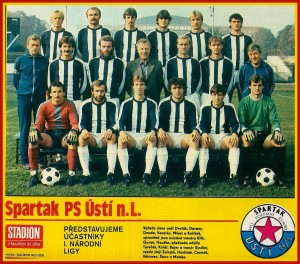
Spartak PS (Usti nad Labem) finished last with 21 points and was relegated.
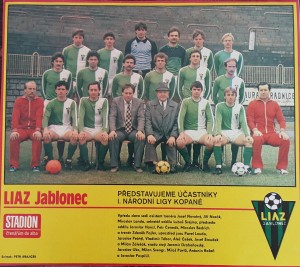
Lucky boys, LIAZ (Jablonec) – back in the 70s they played top league football, but now they were at the bottom of Second Division. 15th with 22 points. But there was Czech team relegated from First Division this year, so LIAZ survived.
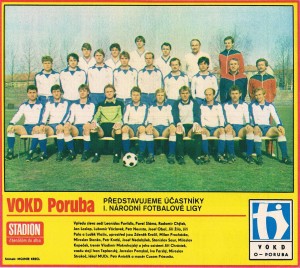
VOKD (Poruba) – 14th with 22 points.

VP (Frydek-Mistek) – or TJ Valcovny plechu – 13th with 23 points. Played briefly in the First Division, but this was solid second-division club. Which had a weak season for some reason, but managed to escape relegation.
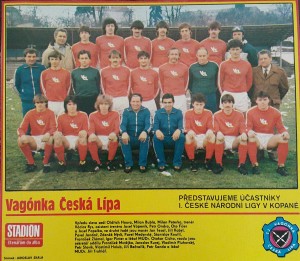
Vagonka (Ceska Lipa) – 12th with 26 points. Many Czechoslovak clubs were attached to industrial plants and this one had distinctive railway sound: railways-cars making factory, most likely. ‘Vagon’ – wagon – railway-car.
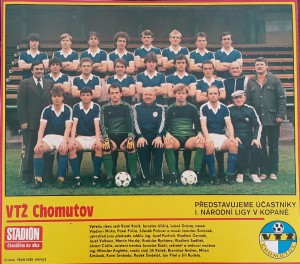
VTZ (Chomutov) – 11th with 27 points.
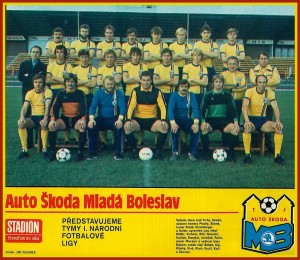
Auto Skoda – or AS (Mlada Boleslav). Belonging to automotive-making giant Skoda, but it was not the ‘flagship’ club – just the team belonging to Mlada Boleslav’s plant. 10th with 28 points.
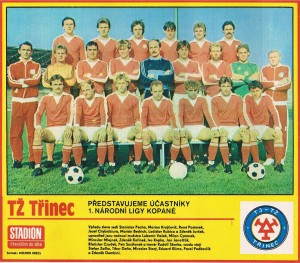
TZ Trinec (Trinec) – 9th with 28 points. They played in the first division once upon a time, then gradually declined to mid-table second division team.
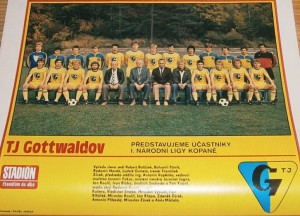
TJ Gottwaldov (Gottwaldov) – like TZ Trinec, their memories of top-level football were fading away and the mid-table of Second Division was the norm. 8th with 31 points.
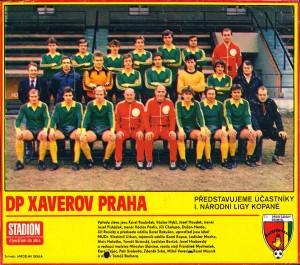
DP Xaverov (Prague) – 7th with 31 points. The only club from Prague in the Second Division, but nothing more than that: a modest club,without ability to climb up. What the name means and represents needs a Czech to tell: it is TJ Drubezarsky Prumysl. Xaverov, as they were better known, seems to be the city district they hailed from. A club from the capital, though… and thus perhaps the only team with some familiar names in it, for veteran players could join the small club for their last playing days. Better than going to the provincials… Dusan Herda was a regular for Slavia (Prague) for years, now he was kicking the ball for Xaverov.
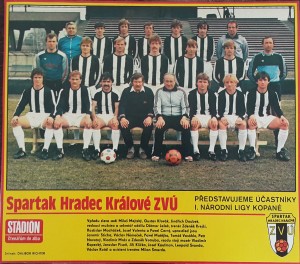
Spartak Hradec Kralove ZVU (Hradec Kralove) – another former first division member. 6th with 32 points.
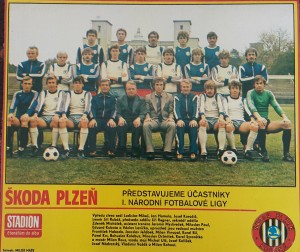
Skoda (Plzen) – 5th with 33 points. One may expect more – much more – from the team belonging to the headquarters of giant manufacturer. They played regularly in the first division during the 1970s, but now – down and out.
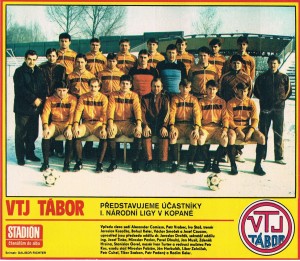
Relativity… modest VTJ (Tabor) was ahead of Skoda. 4th with 34 points. Promotion was out of their wildest dreams, of course, but they were solid second division member and under their own circumstances, had an enjoyable good season.
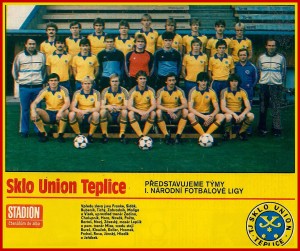
Sklo Union (Teplice) – 3rd with 34 points. Up and down, then up and down again. Quite a disappointing season, for they constantly aimed to return to top flight. Ambition is one thing, reality – another.

Dynamo JCE (Ceske Budejovice) – another club quite familiar with first-division football. However, they were not exactly up to the task – much better than the rest of the league, but too weak to really push up: Dynamo finished 6 points behind the league winners. But there was happy ending for them.
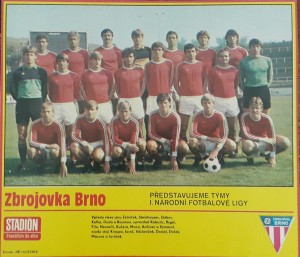
Zbrojovka (Brno) was unquestionable leader and winner of the league – 21 wins, 5 ties, 4 losses, 45-20 goal-difference, 47 points. 6 points ahead of Dynamo, the only team looking like a challenger. The best team by far and it was even a bit strange why Zbrojovka was in Second Division – as names go, they had more formidable squad than may be half of the first division teams. Kroupa, Rygel, Vaclavicek, Jarusek… getting old, though. So far, so good – Zbrojovka was going back to their familiar top league. But it was not to be – they was caught attempting to fix a match and were disqualified for promotion.
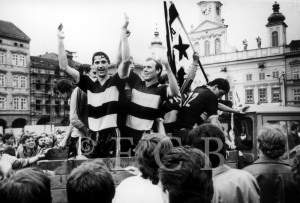
Dynamo (Ceske Budejovice) was awarded promotion in the place of Zbrojovka. No wonder, triumphant team celebrated in the streets of Brno, cheered by happy fans.
Czechoslovakia II Division-Slovakia
Czechoslovakia. Business as usual, generally. A rare look at Third Division teams:
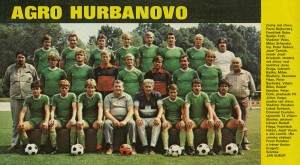
Agro (Hurbanovo) and
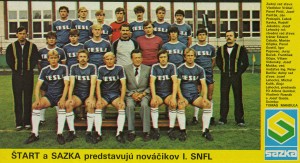
Tesla (Stropkov) won in Slovakia and were promoted to the Second Division.
Second Division, Slovak people’s league. A big number of the teams playing there became better known after the post-Communist split of Czechoslovakia, when the moved up to complete the Slovakian top division. Presently, only 2 teams had played in the First Division, but one of them was in very bad shape. The other one – Plastika (Nitra) – was somewhat curiously not up to task of winning the championship. The newcomers from third level played as exact opposites:
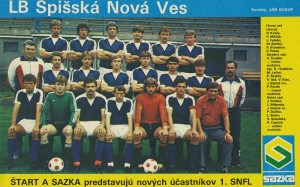
LB Spisska Nova Ves was the outsider – last with 16 points – was relegated right after having been promoted.
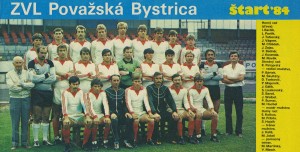
The other newcomer, ZVL Povazska Bystrica, had very strong year – they ended 3rd with 38 points. Not a candidate for promotion, but with just a little luck, they could have been 2nd.
The last three teams in the championship were relegated – this, because both relegated from First Division teams happened to be from Slovakia. Along with LB Spisska Nova Ves, down went TTS Trencin, 15th, and Vagonka Poprad, 14th. Nothing much to say about most of the league and even not sting competition for the top lace: Plastika (Nitra) only managed to clinch 2nd place, beating ZVL (Povazska Bystrica) by a point, but trailed the winners by 5 points. They scored most goals in the season, but who would care about that.
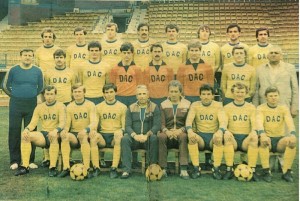
This was the biggest season of unheard of club, which to the mid-1970s was mostly familiar with the third level of the Czechoslovak football. DAC (Dunajska Streda) won the championship and was going up to First Division for the first time in their history.
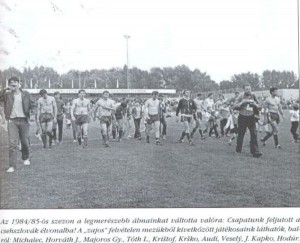
It was fantastic achievement of the modest club, hailing from Hungarian-speaking corner of Slovakia. At the moment, it did not matter at all how they will play in the top league – this moment was just the moment of pure joy. And it was well deserved – DAC dominated the championship, finishing 5 points ahead of Plastika. 19 wins, 6 ties, 5 losses, 60-21 goal-difference, and 44 points.
Switzerland the Cup
The Cup. Switzerland was going to have a new Cup winner this year, no matter the result of the final – Xamax was going to make its second attempt to win the Cup (they lost in 1974) and FC Aarau never reached the final before. Both teams had strong season, but Aarau was perhaps a bit better and prevailed 1-0.
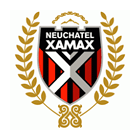
Neuchatel Xamax FC lost a second cup final – to bad, but may be in future they will succeed.
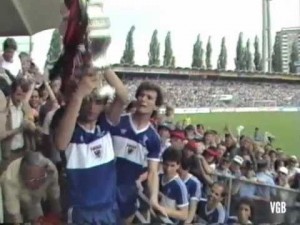
The moment of glory – FC Aarau receives the Cup.
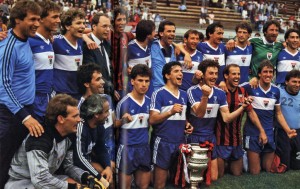
FC Aarau enjoyed its best ever season – they never won any trophy before, never reached the cup final before, never finished 2nd in the championship before. It was wonderful time for a pretty much anonymous squad. A pure victory of the underdog, unlikely to be repeated, thus, much sweeter. FC Aarau won a trophy at last. Perhaps their coach deserves all the credit for their fantastic season – Ottmar Hitzfeld. He was not famous coach yet, but bright and promising one. He was not going to last, though – Aarau was too small.
First row from left: Roberto Bockli, Peter Marti, Armando Granzotto, Thomas Tschuppert, Roberto Fregno, Karl Kung, Walter Iselin, Thomas Zwahlen, Fritschi (?) – superintendant.
Standing: Schibli (?) – assistant coach, Patrick Taudien, Agapios Kaltaveridis, Traier (?) – chairman, Ruedi Zahner, Walter Seiler, Ottmar Hirzfeld – coach, Erwin Meyer, Albert Herberth, Rolf Osterwalder, Max Richner, Hansruedi Schar.
Sweet success.
Switzerland
Switzerland. Standard season, no experiments. The last two teams in the Second Division were so weak, they collectively earned less than half the points the 14th placed had: FC Monthey – 4 points, FC Yverdon – 9 points, but FC Mendrisio – 28 points. Up the table – nothing much, even no dramatic race for the top two places, giving promotion to the top league.
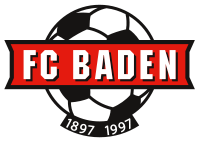
FC Baden finished 2nd with 40 points. Promotion to First Division was their biggest success to date and they were going to join the best for the first time next season.
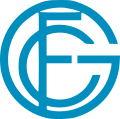
FC Grenchen topped FC Baden and finished the season as Second Division champions. They also had 40 points, but better goal-difference clinched the title – a big success for the small club.
First Division mirrored the second level to a point: two outsiders, so relegation was settled early, and two teams significantly stronger than the others, although the champions pulled ahead and finished with comfortable cushion.
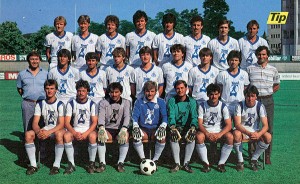
FC Winterthur – last with 13 points. Going down. Top row from left: Christian Schleiffer, Jakob Weidmann, Urs Egli, Uwe Rapolder, Vittorio Bevilacqua, Daniel Haefeli, Hans Franz, Christian Graf.
Middle row: Paul Kilgus (Teambetreuer), Rafael Chèlos, Roger Zimmermann, Dario Zuffi, Reto Arrigoni, André von Niederhäusern, Kevin Streule, Manuel Lopez, Adi Noventa (Trainer).
Sitting: Iwan Csiatare, Peter Leu, Markus Bachmann, Walter Christinger, Ricardo Chèlos, Daniel Bamert, Thomas Unseld.
SC Zug was 15th with 14 points and also relegated.
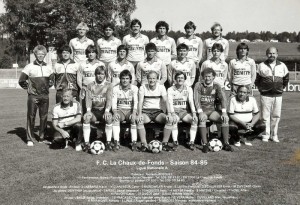
FC La Chaux-de-Fonds – 14th with 24 points. No trouble, but they had to do something, if wanting to stay in the league – nobody can guarantee them outsiders every next season.
Vevey-Sports – 13th with 24 points. Same, as La Chaux-de-Fonds.
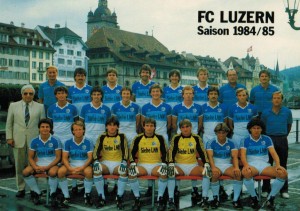
FC Luzern – 12th with 26 points.
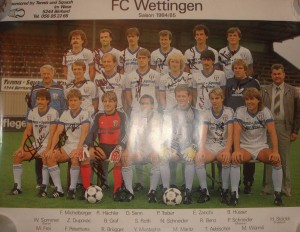
FC Wettingen – 11th with 26 points.
Lausanne-Sports – 10th with 29 points.
BSC Young Boys – 9th with 30 points.
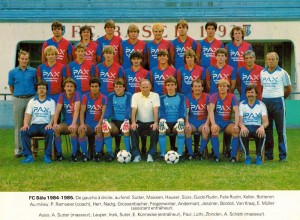
FC Basel – 8th with 31 points. In decline, but given the history of the club, a temporary decline for sure.
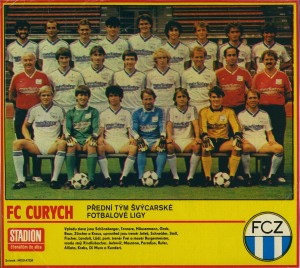
FC Zurich – 7th with 31 points. Similar to Basel and also expected to recover quickly. Perhaps Vaclav Jezek was no longer up to contemporary coaching.
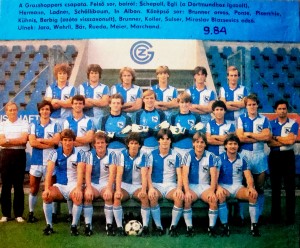
Grasshopper – 6th with 32 points. Like Basel and Zurich, so it was temporary flop, but also the three teams illustrated the general state of Swiss football – no team was able to amass really strong squad and foreign recruits tended to be at their last legs.
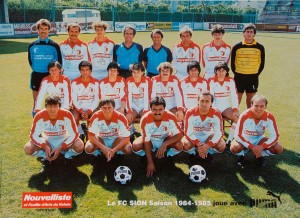
FC Sion – 5th with 36 points.
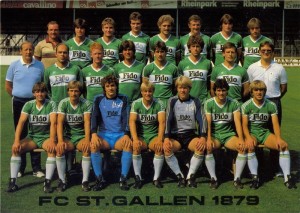

FC St. Gallen – 4th with 37 points. Good season for them, but not particularly great squad – their most famous player was the former Czechoslvak national team defender Ladislav Jurkemik, who, like the key players of Basel, Zurich, and Grasshopper was getting dangerously old.
Xamax FC was perhaps the most promising Swiss team at the moment – they climbed to 3rd place with 39 points, but they were also expected to get stronger and real title contender.
FC Aarau finished 2nd with 42 points. A title contenders for awhile, although more driven by enthusiasm than real power. Having their best season ever, though.
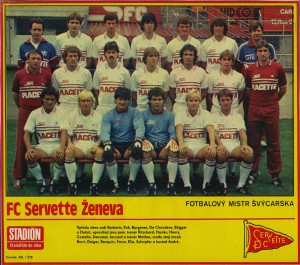
FC Servette (Geneve) managed to pull ahead of Aarau and finished 1st with 46 points. 19 wins, 8 ties, 3 losses, 71-28 goal-difference. They were the strongest, no arguing against that, and the most balanced squad this year. Well deserved 15th title and their first after 1979.
Bulgaria the Cups
The Cups and the scandal. The difficult issue of two national cups. No way the old Soviet Army Cup to be abolished – it was political matter. It was continued and theoretically at least the winner should have been getting one of the UEFA Cup spots Bulgaria had. In reality, it was a tournament of no importance. However, in the yearly books of the time it was still listed as the primary Cup of the country. This season was the 40th issue of the torunament. Cherno more (Varna) and CSKA reached the final this year. It ended as expected – CSKA, even fielding some reserves, including new player of yet very uncertain qualities, named Christo Stoichkov, for a few minutes, destroyed Cherno more 4-0.
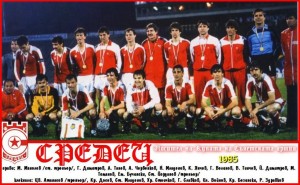
Thanks to the great shadow of the scandal, time plays cruelly on history: this is recent arrangement of the picture of the winners and it is wrongly named – CSKA was still CSKA when they won the Soviet Army Cup, but here they are named Sredetz, the name they got a little later. Standing from left: M. Manolov – coach, G. Dimitrov, L. Tanev, A. Chervenkov, N. Mladenov, K. Yanchev, G. Velinov, V. Tinchev, Y. Dimitrov, M. Tomanov, Em. Buchinsky, St. Yordanov – assistant coach.
Crouching: Tzv. Atanassov – assistant coach, Kr. Dossev, St. Mladenov, Chr. Stoichkov, G. Slavkov, Il. Voynov, Kr. Bezinsky, R. Zdravkov.
This final is often confused with the final in 1986 today, when Sredetz won againt Lokomotiv (Sofia). But most importantly it was left out of the 1985 scandal – this was the only tournament not affected by the scandal. CSKA, disbanded, expelled from first division, Bulgarian Cup not awarded and records stripped, still remained Soviet Army up winner. Why was that? Possibly, it was overlooked in the great frenzy for penalizing – the tournament was of so little importance and simply forgotten. More likely it was left intact for political reasons – not to enrage the Soviets by abolishing their gift. Thus, there was no more CSKA except for the purpose of the Soviet Army Cup. Yet, there was something to put under the table… theoretically, the Soviet Cup winner should get UEFA Cup spot. But CSKA was no more and part of the penalties was not to play in Europe. It was murky case and quickly put under the carpet – CSKA was rightful winner, so not to be replaced by the losing finalist. Neither CSKA, nor Cherno more got UEFA Cup spot – it went to Pirin (Blagoevgrad), suddenly placed 3rd in the final table of championship after CSKA and Levski were expelled and their records stripped. Anyway, this was the only real winner of Bulgarian tournaments which remained intact.
The ill fated Bulgarian Cup final. Levski – CSKA, the big tense derby, with layers of meaning and always ready to explode. The opposition was unsolvable: ‘the people’ vs ‘the state’. Even after Levski was amalgamated with the Police club Spartak the flavor of ‘people’ vs ‘Communists’ was not removed. Additionally, the clubs represented the Ministry of Defense, the Army, vs the Ministry of Internal Affairs, the Police, with their own powers, influences, and interests. Both clubs had mighty supporters among the highest levels of the Communist Party, with CSKA having particularly strong and scheming one. But at the core of the conflict the Communist Party leaned towards CSKA – forget about who was fan of whom, forget about sport, remember ideology, for it was in the center of it: CSKA was created specifically to represent the new, Communist sport, and its supremacy over the defeated, but somehow not entirely wiped out Capitalism. To attack CSKA meant to attack Communism. To weaken CSKA meant to weaken the Socialist state and its leaders. So, often referees were instructed if not to help actively CSKA to victory, at least to put a blind eye to various infringements. In turn, tempers of the players quickly flared and the games transformed into ugly battles. Incidents happened so often, that foreign referees were called for the derby since early 1960s – and matches with foreign referees were played fairly, unlike those with Bulgarian referees. Levski tended to insist on foreign referees, CSKA normally preferred Bulgarians, who could be threatened and manipulated. That was the historic background, to which recent particulars were added to make the mixture explosive: this was the 100th match between the arch-enemies and recently Levski dominated the clash. Levski won the last 7 matches and CSKA had not win since 1982, 9 consecutive derbies altogether. This was big insult without anything else, but there was more: In the 1980 CSKA built its third great team, which won 4 titles in a row. There was real hope the golden 1950s, entirely dominated by CSKA to be repeated. The squad was great and young, and so far was running fine. But a bit later Levski had its own great young squad,which not only challenged CSKA, but now appeared to come on top and dominate Bulgarian football – they won everything in 1984, now got second title in a row, and there was no stopping. It was not only younger team than the CSKA’s squad, which did not even reached its peak yet, but it was home-grown team. That was part of mythology, which Levski’s fans waited quite long to happen again: the ‘blues’ were ‘real’ team, making its own players, unlike CSKA, stealing talent from the whole country. After Levski was taken by the Police, it became like CSKA and point was lost, but now the talented juniors were back at last. Not only that, but the boys were different – they openly identified themselves with the fans, they had ‘the true spirit’. No wonder: most of the team were both fans and players of Levski since early childhood, they came from the youth system of the club, but also from the stands, and often acted more like fans than players: beating CSKA was much more than just a football game for the, they were gangly, cocky, fearless, and acted together – after all, they were together since early childhood and were good friends. This spirit, perhaps more than talent, scared CSKA officials, for it looked like they openly defied state power and inspired the real fans into rebellious behavior. Perhaps if they were not winning, they could be tolerated – but they were winning and CSKA was seemingly going to be behind them for a long time. And to make the bomb ticking quicker, both clubs had coaches who never shied away from dirty tricks and provocations, fighters, who went to the derby as if going to war, and not really restraining their players, but encouraging them to fight by any means. Of course, nobody will ever know who gave what instructions to the referee, but it was clear from the beginning of the match that it will be troublesome one. Jumping a bit ahead of time, the referee Asparoukh Yasenov always denied that he was ‘instructed’ to help CSKA – he claimed that he made mistakes and lost the match because of the high pressure of refereeing the derby, his fault, but no more than that. Except he blamed the scorer of the first illegal goal for not telling him he played with a hand. He did not see it, Yasenov said, the line referee did not signal either, but Georgy Slavkov never confessed to him. Well, there is no player in the world, who will go to the referee and tell him to disallow his own goal – and Slavkov said exactly that: yes, he played with a hand, but it was not his job to call fouls – it was the referee’s job. The referee allowed the goal, a fact. It was the referee’s job to judge, a fact. So, at the end Yasenov insisted only on crushing under pressure and allowing the game to slip out of his hands, a weak spirit, not up to the task, not experienced enough. His explanations never convinced anybody, for all of that happened many times before – usually CSKA provoked and was let go unpunished, which triggered retaliation by Levski, also allowed by the referee as a compensation, the match deteriorates into open fighting and referee at the end expels players from both teams, not making any distinction between guilty and innocent. At the end, both teams are angry and complain. And that was what happened in this time as well. At first CSKA went into attack and pressed Levski back. Levski started somewhat sluggishly, but such things happened many times before. Some questionable tackles were made, but nothing out of hand yet. Until the 26th minute, when Slavkov scores the opening goal after playing with his hand. Everybody sees it except the referee. No signal from the liner, yet, it happened right in front of him. The goal is allowed, Levski players are enraged, surround the referee and push him every each way. Yasenov immediately gives the impression of a guilty man – instead of showing cards and firmly restore order, he seems to be trying to run away from his attackers and the incident lasts too long. Now everybody is sure that the referee is biased. His authority is lost. Levski is enraged, CSKA players also clearly understand that referee lost his authority and will allow anything just to compensate for this goal. Both teams has short-fused fighters, ready to break bones. The war begins in earnest, the coaches do nothing to calm down tempers. The match deteriorates immediately, ugly tackles happened one after another and every call of Yasenov is immediately protested by both teams. Near the end of first half CSKA scores second goal, which is fair, but damage is done already and nothing could be fair anymore. The second half begins with particularly ill mood, there is hardly any football played – everybody just tries to kill the nearest opponent. And Yasenov does nothing… Plamen Nikolov (Levksi) should be sent off , but he only gets lame yellow card. Yanchev (CSKA) should be sent off for hunting brutally Emil Spassov, the gentle midfielder of Levski, and was not even warned. Then Plamen Nikolov tackles Zdravkov of CSKA so badly, Zdravkov was sent directly to hospital, and only now Yasenov expels Nikolov. But nobody is guilty anymore – everybody protests and ugly mood only escalates, both teams transformed into berserk murderers. Yanchev tackles Spassov just out of spite and Spassov is finally provoked to reatiliation, for it is clear that the referee will do nothing. He grabs Yanchev by throat and only now Yasenov interferes, redcarding both players. This incident triggers a fight between both teams, including the reserves and the coaching stuff. Meantime CSKA gets a penalty, immediately protested by Levski with much pushing of Yasenov, who again does not show cards. CSKA does not score the penalty, which enrages them, for the save boosts both Lesvki players and fans – now it looks like the game could be turned against the odds and CSKA does not like that. They respond with brutality, triggering the mass fight on the pitch. This is the moment Yasenov to stop the game – but he does not. He expels Spassov and Yanchev, which is unfair – Spassov, a player who was never booked in his already 10-years long career, is not guilty. He only retaliated to brutality left to run free for long – the referee did not do anything to stop it, so what else to do after one is kicked around. The match continues for some foggy reason known only to the referee and the stupid officials of the game, who did not interfere and stop the game either. Levski gets a penalty, which CSKA does not like, of course, and Sirakov scores. 1-2 and 8 minutes to fight. Levski tries hard to equalize, but unable to score. Game over, CSKA wins 2-1. But nobody is happy, the mood is so bad, a fight starts again in the tunnel leading to the dressing rooms. This time the coaches, Manol Manolov, CSKA, and Vassil Metodiev, Levski, are involved. The last fight had no witnesses, so it hard to say what really happened – years later both coaches dismissed the story, but they were also like that: fighters. Even if they really fought, it was nothing special for either of them – a few punches, big deal. Does not count as anything. It was shameful match, but hardly all that terrible – ugly tackling, fights, deliberate injuries of opponents, arguing and pushing the referee – all that happened many times before and there were uglier and more scandalous clashes in the past. May be the match should have been stopped and abandoned, when it became clear it went out of hand, but it was not.
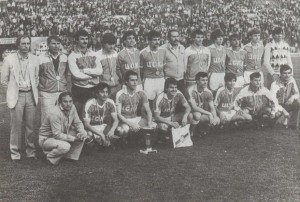
CSKA got the Cup, the spell was broken, they won at last against Levski. Nobody looked paricularly happy after all what happened on the field, but game over and life could go on. And it did until the next morning.
The Comminist Party reaction was quick, surprising, and heavy-handed. The next morning the newspapers announced its decision: it denounced the hooliganism of the previous night as something entirely despicable and advised the Football Federation to punish the culprits as follows – the final to be voided and the Cup to be given to anybody this year. CSKA and Levski to be disbanded, expelled from the championship as well, and their records stripped; their functionaries punished and expelled from sports, coaches and players suspended and fined. The whole thing was presented as a advisory proposition to the Football Federation and the Central Sport Committee, but nobody made the mistake to believe the wording – it was an order.
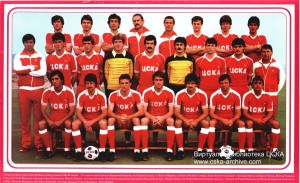
This order made something unthinkable – CSKA was not only a Cup winner for a night, but seized to exist. The creation and the symbol of the Communist power was no more, abolished by its own creator. That is why the photo of the winning team is worth showing – it was and it was no more. It was strong and talented squad, suddenly perished. Top row from left: Bezinsky, Slavkov, Markov, Dr. Fillipov – doctor, Levonyan -masseur, Yanchev, Tinchev.
Middle row: St. Yordanov – assistant coach, Kostadinov, Todorov, Velinov, Bogomilov, Dossev, Y. Dimitrov, Kirov, M. Manolov – coach.
Sitting: Kerimov, Zdravkov, N. Mladenov, G. Dimitrov, Tanev, St. Mladenov, Voynov.
The Party order was followed, of course, only to add more bitterness. Levski and CSKA were disbanded, there was no Bulgarian Cup winner this year, and Trakia was proclaimed champion of the country out of the blue. Clubs, belonging to big structures were forbidden – namely, clubs belonging to the Ministry of Defense (CSKA), the Ministry of Internal Affairs (Levski-Spartak), the Ministry of Transportation (Lokomotiv Sofia), and Headquarters of Building Army (a peculiar branch of the military, where soldiers served their spells as workers in industrial plants and large building sites – Slavia Sofia belonged to this body). Backtracking started just as soon as the Party announced its severe decision: Lokomotiv and Slavia had nothing to do with the Cup final, but were penalized – somehow, it was not good to highlight only CSKA and Levski, let make a bulk. Naturally, functionaries of both clubs and both coaches were penalized – the coaches, the lowest in the hierarchy, got the most severe punishment: banished from having anything to do with football. That is, they were forbidden to practice the only profession they had for life. There were fines as well, but fines were peanuts compared to taken away a profession. With players, things were more selective and suspect: Plamen Nikolov, Borislav Mikhailov, Emil Velev, and Emil Spassov of Levski-Spartak and Christo Stoichkov of CSKA were banished for life. Hasko Sirakov, Miroslav Baychev (Levski-Spartak) and Vassil Tinchev (CSKA) were suspended for 1 year. Kostadin Yanchev (CSKA) was suspended for 3 months. It is debatable who was more or less guilty, but the distribution of penalties was clearly one-sided and far from fare: Levski players were hunted down, but hardly those of CSKA. Key regular players of Levski were eliminated, but no such players of CSKA – Tinchev was not exactly a leading player and Stoichkov – just a newcomer, who played only a few games, not a regular and not a star at all. Kostadoin Yanchev who brutally tackled and provoked Emil Spassov to retaliation got only 3-month suspension and his victim, a mellow player, never involved in any dirty tricks, was banished for life. Why Baychev was suspended is a mystery – he also was not a brutal player and was hardly involved more than others in the fracas. On this level, CSKA was practically let go – young Stoichkov was the scapegoat, just to show that CSKA is punished too, but the fact is he was the least important member of the squad and although heavily involved with fighting on the pitch, he was practically sacrificed. No star of CSKA was penalized when half of the regular team of Levski was out for life. The worst penalty was reserved for Plamen Nikolov and Emil Spassov and it was not even named: both were to be transferred to FC Porto and now the deal was quietly killed. Easy doing: since they were banished from football, what transfer? There were no such players. Fairness really went to the drain with the penalties – CSKA was disbanded for despicable behavior, yet, there were players committing despicable acts. It was clear from this moment that all is just a gas and restoration will take place. Little doubt about it… abolishing CSKA cannot be, for it was an abolishing a key Communist symbol. But restoring CSKA cannot happen without restoring Levski-Spartak – it will be both, measured were taken really to weaken Levski. Mind, abolished were only the football sections of multi-sport clubs CSKA and Levski-Spartak – the clubs themselves remained, contrary to the original wording of the Party’s decision. They remained exactly as CSKA and Levski-Spartak, which remained under the sponsorship of Army and Police, in all other sports they participated with teams named CSKA and Levski-Spartak. So, it was not exactly what the Party ordered when its great anger was unleashed – powerful voices of the same Party spoke otherwise behind the scenes almost as as soon as the rush decision was published and recovery was already started. And that made the whole affair even more unfair – it had nothing to do with justice, with injured morals, with correcting shameful incident. It was just a stupid vitriol and inside battles between power holders and lies. It was heavy blow and not only to CSKA and Levski – bystanders suffered too, becoming collateral damage. Financially, may be Lokomotiv (Sofia) was the biggest victim, for they had less money than anybody to begin with – now they were cut even from that. As symbols go, supporters of many provincial clubs practically lost their identity, for out of the blue their clubs were renamed – and they had nothing to do with the ill-fated final. As corruption and black deals and scheming and influencing go – well, it was fine as ever, nothing changed. The bribing scandal in the Second Division was uncovered at the same time the Party waived its great banner of justice – and put under the lid just as quickly, for if real investigation and justice had to be done, important Party people had to go to jail. In the whole noise one other thing was left almost unnoticed: the stupid referee allowing the final to deteriorate was hardly ever mentioned and not punished at all. Behind all this lunacy was the powerful member of the Central Committee of the Comunist Party Milko Balev – a vivid supporter of CSKA, whose hatred of Levski was bigger than his love for CSKA. And because of him, another dark figure is hardly ever mentioned and practically forgotten today – his name does not even comes to mind today, but he hated Sofia clubs, supported Trakia (Plovdiv), and did a lot to push his own agenda, seizing the moment – destroy the Sofianites and make Trakia champion. Petty aim, thus, even more destructive. Justice… there was nothing just at all. Problems popped out right away, quickening the backtracking – the immediate one was the qualifications for the World Cup. Bulgaria had a chance and wanted to go the finals,and the Party was never to sacrifice some kind of popular glory for justice. Those banned for life were key national team players… they were restored, all punished players. The aftermath… the next season was unusual, because CSKA and Levski, now under new names, were in disarray, but only for that season. The Party did not even had the guts to move the ‘expelled’ and ‘disbanded’ teams to the Second Division. Christo Stoichkov still has a grudge for the ‘bastards’ – meaning mostly the Football Federation – for almost destroying his career before it even started: he was the likeliest candidate to serve at least a large chunk of his original penalty, for he was nobody, thus, the easiest showcase of ‘principles in action’. CSKA was openly back under Army umbrella after less than two years, Levski back in the hands of the Police, although this was supposed to be a secret. Nothing changed except the names were new – and hated by the fans of both clubs; trophies for this season were lost – and restored years later; Bulgaria had no team for the Cup Winners Cup for the 1985-65 issue of the tournament; players fretted for awhile that their penalties may be real – but perhaps by the start of 1986 even Stoichkov was not assured that there was nothing to fret about. Coaches and functionaries were not exactly left jobless and even Nikolov and Spassov went to play abroad. These two were the only ones to really suffer – FC Porto was just beginning its great climb leading them to winning the European Champions Cup. Nikolov and Spassov may have been part of this success – but they lost the contract and playing a bit in Sweden and Belgium was hardly a consolation.
